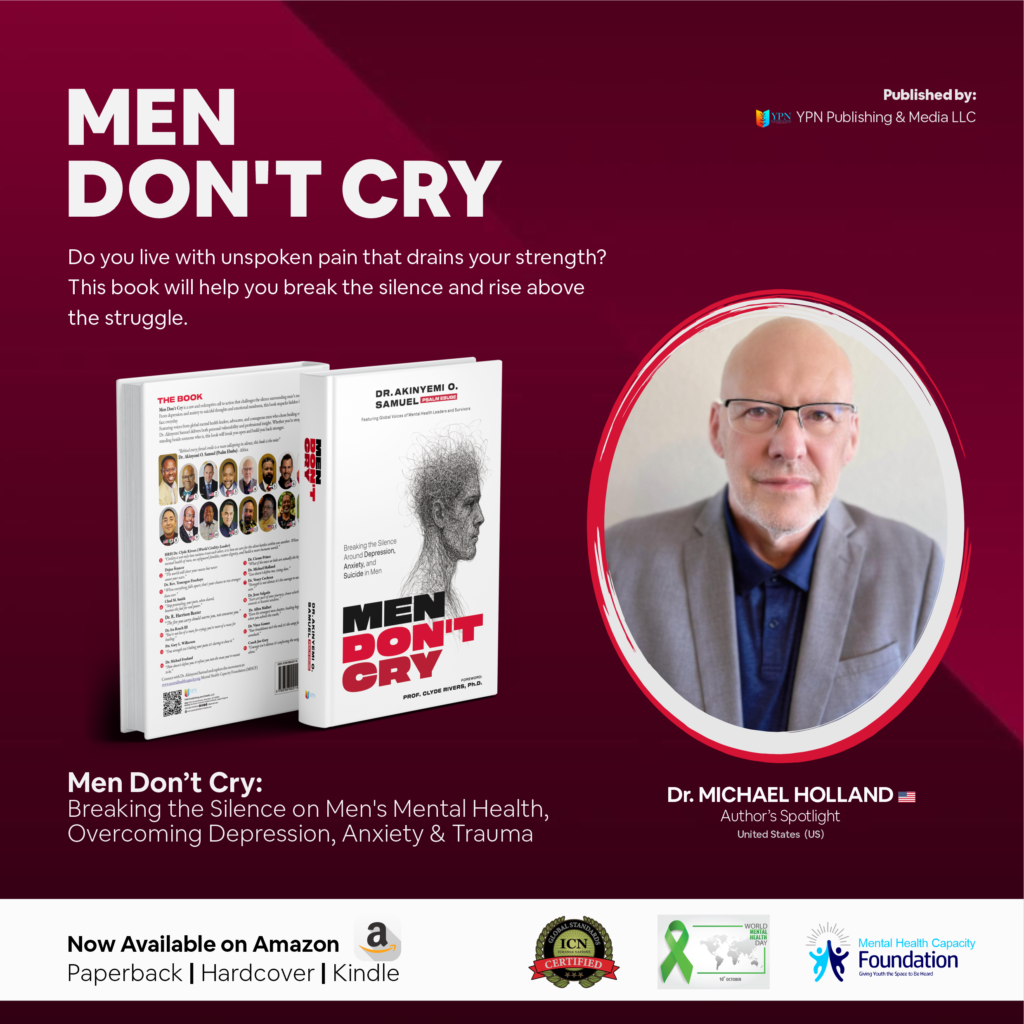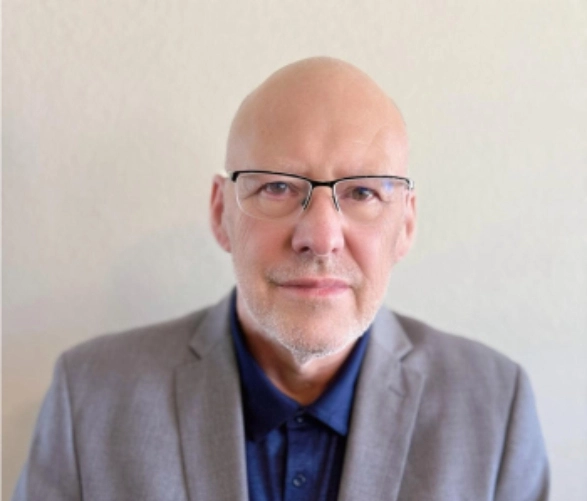Sheridan, USA October 04, 2025 Innovation Times Senior Correspondent
Loss doesn’t define me, rising does. Those words capture the heart of Dr. Michael Holland’s deeply moving chapter Reclaiming Life and Purpose After Loss and Depression in the acclaimed book Men Don’t Cry. As the world prepares to mark World Mental Health Day on October 10, under the theme Breaking the Silence: Men’s Mental Health and Access to Care in Times of Crisis, Dr. Holland’s message stands as a beacon of resilience, hope, and renewal for men everywhere.
Loss, in its many forms, often comes uninvited. A breakup, the death of a spouse, the collapse of a career, or the loss of a home can shake a man to his very foundation. These are not just experiences of absence. They are seismic disruptions that challenge identity, stability, and purpose. A job is never just a paycheck; it provides structure and meaning. A home is not simply walls and a roof; it is safety, comfort, and memory. A relationship is not only companionship; it often becomes a part of who you are. When these anchors are suddenly stripped away, men can feel as though the ground beneath them has crumbled.
Dr. Holland writes with piercing honesty about these moments of disorientation. When everything familiar falls apart, it is not only the external loss that hurts, but also the internal unraveling. Dreams are shattered. Futures once envisioned are suddenly gone. What is left are raw questions: Who am I now? What happens next? Why should I keep going?
Depression often lurks in these shadows. Sadness can deepen into despair, fear into paralysis, and isolation into unbearable loneliness. Many men, conditioned by culture to remain silent, endure these battles quietly. They continue to show up, to wear the mask of strength, even as their souls are breaking inside. It is here that Dr. Holland’s chapter offers a lifeline.
He insists that loss is not the end. Instead, it is the soil in which resilience can grow. While loss shatters, it also strips away illusions, leaving behind a blank canvas on which new purpose can be drawn. In these painful spaces of emptiness, men are given a chance to redefine their lives, to rediscover themselves beyond roles, titles, or possessions.
The journey of recovery, Dr. Holland stresses, is not dramatic. It does not happen overnight, nor does it come with quick fixes. Healing begins with the smallest of steps: the decision to get out of bed when everything screams against it, the choice to talk to someone instead of retreating, the willingness to try again even after failure. These steps may feel insignificant in the moment, yet they accumulate into transformation.
What makes Dr. Holland’s chapter profoundly impactful is that it reframes suffering. Pain is not simply something to endure but something that can be used. Depression and loss can either consume a man or refine him. The very thing that once threatened to bury him can become the foundation upon which he rises stronger than before.
Through personal insight and pastoral wisdom, Dr. Holland shares stories of men who have walked this road. Men who lost careers but discovered new callings. Men who buried loved ones but emerged with renewed compassion. Men who thought their lives were over, only to find that brokenness became the beginning of a new kind of wholeness.
He compares this process to the refining of gold. Gold does not reveal its brilliance until it passes through fire. Likewise, men often do not uncover their deepest strength until they face the furnace of loss. It is in being pressed, in being tested, that the true character of resilience emerges.
Dr. Holland’s words challenge the false narrative of masculinity that equates silence with strength. He calls for men to reject the lie that expressing grief or admitting depression is weakness. Instead, he declares that the willingness to confront pain, to speak it, and to walk through it is the very essence of courage.
The chapter does not minimize the difficulty of the journey. It acknowledges the nights of weeping, the heaviness of despair, and the temptation to give up. Yet it consistently reminds readers that even in the darkest valleys, the seed of recovery is alive. Every breath taken is evidence that life has not ended. Every small step forward is proof that strength still remains.

On World Mental Health Day, Dr. Holland’s message will resonate deeply with men across the globe. Too many men have been taught to internalize pain, to bury depression, and to fight silent battles alone. Access to care begins not only with systems of support but also with permission; the permission for men to grieve openly, to seek help without shame, and to admit when they are breaking.
This is what makes Reclaiming Life and Purpose After Loss and Depression more than a chapter. It is a guide for the broken, a companion for the grieving, and a map for those who feel lost. It lights the path from despair to renewal, showing men that they are not defined by what they have lost but by how they choose to rise after loss.
For families and communities, the chapter is equally essential. It provides insight into the silent struggles of men they love. It equips them to listen better, to offer compassion instead of judgment, and to create safe spaces where men can share without fear.
Reading this chapter is like hearing the voice of a trusted friend who has walked the valley and returned with wisdom. It is gentle yet firm, compassionate yet challenging. It tells men that while they may have been crushed, they are not destroyed. While they may have stumbled, they are not finished.
As the world focuses on mental health this October 10, Dr. Holland’s contribution is a reminder that loss is a universal human experience, but depression does not have to be a permanent sentence. Recovery is possible. Renewal is within reach. Rising after loss is not just a dream; it is a decision.

For those ready to begin this journey, Men Don’t Cry is available now. The Amazon Kindle edition allows readers to start immediately. The Paperback edition offers a practical copy to share or study in groups. The Hardcover edition provides a lasting keepsake of one of the most important conversations of our time.
To purchase this book is to invest in more than words. It is to invest in healing, in courage, and in the reshaping of what it means to be a man. It is to declare that silence will no longer be the only option for men battling depression and loss.
Dr. Holland’s chapter will change lives because it is honest, compassionate, and deeply hopeful. It tells men the truth they have been waiting to hear: that their loss does not define them, their depression does not imprison them, and their pain is not their final story. What defines them is the choice to rise, to reclaim life, and to walk forward with purpose once again.
On October 10, as Dr. Holland speaks, he will not just be addressing an audience. He will be speaking directly into the hearts of men who are weary, broken, and on the brink of giving up. His words will tell them that even after loss, even after depression, there is still hope. There is still life. And there is still purpose to be found.
In the end, Reclaiming Life and Purpose After Loss and Depression is not just a chapter in a book. It is a lifeline. It is a call to rise. And it is a testament that even when everything falls apart, men can stand again; stronger, wiser, and more whole than before.
ABOUT THE AUTHOR
Dr. Michael Holland is an internationally recognized leader in integrative medicine, human transformation, and global civility. He holds a Bachelor of Science in Kinesiology from California State University, San Bernardino, a Doctor of Physical Therapy degree from Loma Linda University, and a Doctorate in Integrative Medicine from the Canadian College of Humanitarian
Medicine. He has also received two honorary doctorates from institutions in Canada and Africa, honoring his contributions to health and humanity.
As the founder of Triune Health Arts, Dr. Holland has built a pioneering naturopathic platform dedicated to helping individuals restore balance in mind, body, and spirit. His mission is to empower people to become healthy, self-aware, and purpose-driven through personalized, preventative care that blends science, tradition, and inner discipline.
Dr. Holland’s impact extends globally. He is a World Civility Ambassador for I Change Nations, a Presidential Lifetime Achievement Award recipient, and serves as Royal Advisor to King Okogeyman Obremponnsu Kobina Amissah I of Ghana. In 2025, he received the President Girma Wolde Giorgis Award for his leadership in delivering human-centered solutions to global challenges. Through his work, Dr. Holland continues to inspire communities worldwide, demonstrating that true health begins with understanding oneself and living in harmony with that truth.



